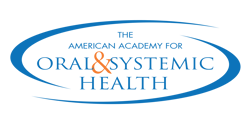AAOSH Responds to the AP Flossing Report
A recent report by the Associated Press (AP) calls into question the health benefits of flossing, suggesting that no scientific evidence links flossing to better oral health. Unfortunately, the media coverage of this report has led many people to believe that flossing is not important for oral or overall health.
In today’s world we look to the evidence—the research—to determine whether our current beliefs hold true. The AP’s review—which was not conducted by a scientific organization—is concerning. Many medical and dental groups have openly objected to the AP’s report, criticizing its lack of practical perspective.
These studies and the media reports miss and understate the actual harm done by not flossing—by failing to acknowledge emerging research which shows gum disease’s impact on whole-body inflammation and disease. Taken at face value, health professionals and the public at large may erroneously conclude that relaxing oral hygiene standards and practices for complete bacterial removal is now okay (e.g. not cleaning between teeth which requires string floss along with other methods). Further, they mistakenly conclude and lead the public to believe there is no increased health risk for the kind of systemic inflammation that increases and causes heart attacks, strokes, Alzheimer’s, diabetes, and more when the more dangerous bacteria are not eliminated.
Preventing gum disease and its systemic health effects is not a matter of simply brushing and flossing. Periodontal disease is complex. The disease process deteriorates the bony housing and negatively affects the blood vessels and organs of the body. Periodontal disease affects 80% of all adults in varying degrees of severity.
The mouth is home to over 700 known bacteria, some of which are helpful and some which are downright dangerous. Bacteria that congregates around the tooth near the gum line is known as a plaque biofilm. Here the bugs can multiply, which stresses the body toward disease. An individual’s response to the presence of the causative bacteria is dependent on their own body’s immune response. Factors that influence susceptibility include smoking, uncontrolled (or unknown) diabetes, nutrition, stress, quality of sleep, other disease stressors such as cancer or cancer therapy, and to a small extent, genetics. The complicated nature of individual susceptibility is the reason a small percentage of adults are able to avoid periodontal disease with minimal home care.
Many don’t realize that periodontal disease is an infectious disease, so it can be transmitted from person to person by sharing eating utensils, water bottles and even by kissing. An even more severe scenario occurs when some of the more dangerous bacteria enter the bloodstream through inflamed gum tissue and travel to other organs and multiply there. Countless scientific studies have implicated these dangerous oral bacteria in serious medical conditions such as heart disease, stroke, diabetes, Alzheimer’s disease, cancer, and pregnancy complications such as pre-term labor and stillbirth.
Once you have periodontal disease, it is best to be treated completely with customize therapy based on a thorough diagnostic workup. Insist that your dentist include saliva bacterial testing to determine the presence (and quantity) of the most threatening bacteria that might be at work in your disease. An informed dentist will then create a personalized treatment plan to disinfect your mouth. This might include a targeted antibiotic therapy, ultrasonic cleaning, laser therapy and/or deep cleaning with hand instruments. Once the mouth is cleared of dangerous bacteria, a friendlier biofilm replaces the old. The gums can regain health but normally the bone does not grow back, making daily plaque removal more challenging. Original bacteria levels and disease can return in as few as 90 days if ideal homecare efforts aren’t made. Daily plaque removal by brushing and flossing, tongue scraping, and using an irrigator for the remaining pockets must be performed to prevent more disease.
The American Academy for Oral Systemic Health (AAOSH) is a scientific organization that is comprised of healthcare professionals across medicine and dentistry. In a clinical setting, our members see the benefits of regular biofilm removal—and, more importantly, the consequences of biofilm that is allowed to grow without disruption.
AAOSH continues to support the practice of flossing, brushing, irrigating, and tongue scraping and seeing a dentist and primary care physician regularly as part of an overall wellness approach to health.
As part of our commitment to expanding awareness of the connection between oral and overall health, we want to encourage the public to use our Find an AAOSH Health Professional tool to search for a practicing AAOSH member in your area. Our members pay special attention to emerging science as well as leading technologies and practices that will help you reduce your health risk factors and assure you a healthier future.
Download AAOSH's official position paper
